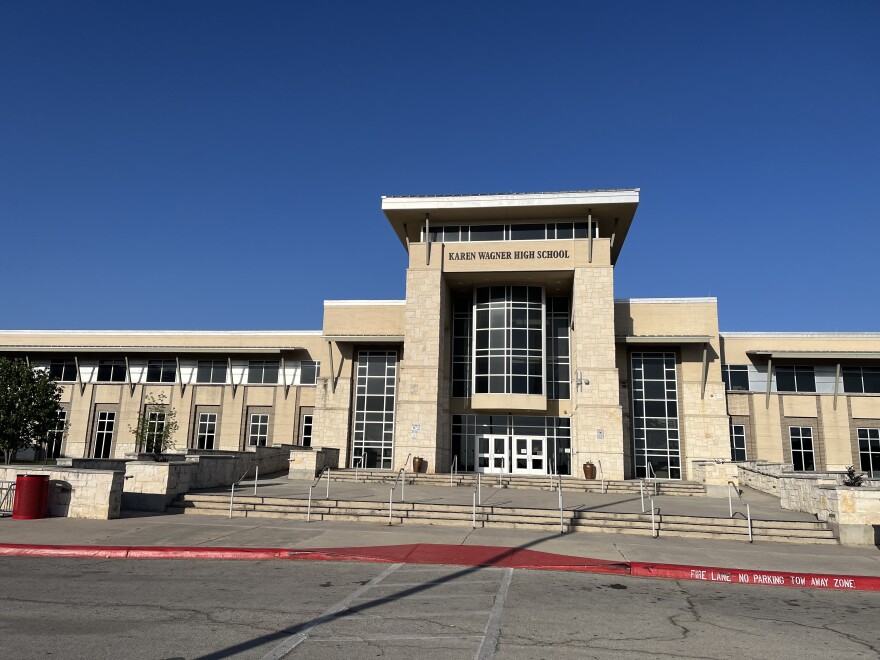Sign up for TPR Today, Texas Public Radio's newsletter that brings our top stories to your inbox each morning.
The Judson Independent School District, like many districts in Bexar County and across the state, is staring down another year of deficit spending, and it is looking for ways to trim next year’s budget.
Bills working their way through the Texas Legislature could give public schools their first substantial increase in state funding since 2019, but districts aren’t counting on it as they plan their budgets. The increases lawmakers are considering fall far short of what is needed to keep up with inflation.
District leaders at Judson have presented their school board with a wide range of possible ways to offset next year’s current projected deficit of nearly $48 million, from reducing the number of librarians and gifted teachers to increasing the average class size.
Judson’s board members have taken it a step further by asking the public for ideas and feedback at a series of town halls.
At the Wagner High School library on Thursday, trustees Laura Stanford and José Macias Jr. asked a small group of about two dozen people for ideas.
Stanford passed a mic around, while Macias wrote suggestions on a whiteboard.

The side of the white board dedicated to what the group of parents and staff want to save quickly filled up.
One wanted to keep all librarians. Another wanted to preserve salaries. A third wanted to protect gifted programs.
“Someone once said to me, ‘This board is not willing to cut,’ but I'm not seeing that it's easy for the community to cut either,” Stanford said, asking for suggestions for cuts.
One man suggested the superintendent and other district leaders take a pay cut. A woman asked if the district had considered closing campuses with low enrollment.
District leaders said school closures were not on the table right now, because it’s not something that could be done before next school year. Macias expressed doubt that closing campuses would save much money.
“To be frank, we're having this conversation because you're going to find there's no easy solution anywhere, anywhere,” Macias said. “These are going to be some hard decisions [that] will have to be made.”
Last year, Judson trustees voted to take an outside-the-box approach to reduce the deficit: something called disaster pennies. Essentially, disaster pennies are cents districts are allowed to temporarily add to the tax rate for operating expenses. They function like golden pennies, which are exempt from the Texas school funding formula.
Because the state decides how much money schools get per student, districts don’t usually get more money even when they collect more in local property tax. Instead, the state just reduces how much it chips in. But ISDs are allowed to keep all of the tax they collect from golden pennies without losing any state funding.
Superintendent Milton “Rob” Fields said adopting disaster pennies gave Judson an extra $12 million this school year. That helped the district reduce this year’s deficit to less than $22 million. But Judson won’t be able to count on that money next year unless voters agree to convert the temporary disaster pennies into permanent golden pennies. Trustees are considering asking voters for that approval in November.

Judson’s trustees have not yet voted on any proposal to cut spending or increase revenue, but they discussed several options at a board meeting on April 3.
One idea suggested by district leaders would lower the salaries of uncertified teachers by 10%, saving $925,000.
Another possibility is increasing the average class size by two students. That would move elementary classes from 21 students to 23, middle school from 23 to 25, and high school from 24 to 26.
District officials also raised the idea of reducing the number of librarians and gifted teachers, saving anywhere from $1.5 million to $550,000 depending on much they cut.
Judson could also cut the number of days principals and some other employees are paid, and either reduce the number of counselors or the number of assistant principals at middle schools.
Parent Sandra Hernandez expressed concerns about several of those options during public comments. She said her daughter has flourished under the instruction of her gifted teachers.
“She's doing fourth grade level math as a third grader. Came home with a 100 for her nine weeks. And I'm emotional, because I love these teachers,” Hernandez said. “It sounds like I'm bragging about my daughter, but I'm bragging about these teachers. They helped my daughter mold into the person that I am proud of and that I hope people respect. I'm a single mom, and with their encouragement, it makes all the difference.”
Sarah Mills, the librarian at Franz Leadership Academy, told trustees students are better served when they have a full-time librarian on campus.
“As a librarian, I can continue to teach students each day, but now my instructional focus has shifted to skills that span the curriculum, making connections between learning, which is where the power of building knowledge truly takes place,” Mills said.



